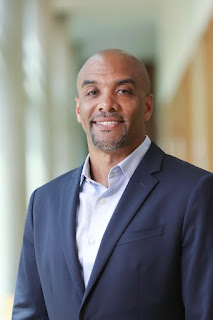Chad L. Williams is the author of the new book The Wounded World: W.E. B. Du Bois and the First World War. His other books include Torchbearers of Democracy. He is the Samuel J. and Augusta Spector Professor of History and African American Studies at Brandeis University, and he lives in Needham, Massachusetts.
Q: What inspired you to write this new book about W.E.B. Du Bois’s experiences during World War I?
A: In October of 2000, while conducting research at the University of Massachusetts-Amherst for my doctoral dissertation (which ultimately became my first book, Torchbearers of Democracy) I encountered an 800-page unfinished and unpublished manuscript by Du Bois on the Black experience in the war that, to my astonishment, no scholar had fully explored.
From that moment I was inspired to learn more about what would have been one of Du Bois's most significant works of history and tell the remarkable story surrounding it.
I wanted to understand what World War I meant to Du Bois--personally, politically and intellectually--but also shed new light on what World War I meant for Black people and the struggle for freedom and democracy in the 20th century.
Q: How was the book’s title--which comes from part of the title of that unfinished work by Du Bois--chosen, and what does it signify for you?
A: Du Bois titled his unfinished book The Black Man and the Wounded World. So I draw the title of my book from his, and explore the profound question Du Bois was attempting to wrestle with: what does it mean as a Black person to live in a wounded world, a world wounded by war, as well as by white supremacy, empire, economic exploitation and the failure of democracy?
These concerns shaped Du Bois's complicated relationship to the history and legacy of World War I and remain urgent matters today.
Q: In a review of the book in The New York Times, Matthew Delmont wrote, “Williams’s book is a fitting coda to Du Bois’s unfinished history of Black Americans and the First World War.” What do you think of that assessment?
A: In his 1940 book, Dusk of Dawn, in the chapter titled “Propaganda and World War,” Du Bois mentions the “mass of documents” he collected for his unfinished book. He wrote, “I hope sometime that a careful history based on these documents may see the light.”
Du Bois’s charge stayed at the forefront of my mind as I completed The Wounded World. I would like to think that Du Bois would be pleased with my book.
Q: How did you research the book, and did you learn anything especially intriguing or surprising?
A: Du Bois’s own massive archive—his book manuscript—along with the primary sources he collected—hundreds of letters and diaries from Black soldiers, photographs, official military documents, newspaper clippings, books and articles about the war—serve as the foundation for the story I tell in The Wounded World.
I was repeatedly surprised by how long—over two decades—Du Bois spent researching, writing and agonizing over his book that he ultimately never finished. I also learned about Du Bois and just how important World War I was to his intellectual and political evolution.
Q: What are you working on now?
A: I am hoping to edit Du Bois’s manuscript and, even in its unfinished state, bring it to the public as an important part of his corpus and broader intellectual and political development. I am also interested in exploring the evolution of Black Studies, as well as its significance in current debates and controversies about the teaching of history.
Q: Anything else we should know?
A: While The Wounded World is a story about Du Bois, it is also a broader story about African American identity. In his classic 1903 book The Souls of Black Folk, Du Bois described the painful tension–the “double consciousness”--of being Black and being American.
How Du Bois envisioned World War I as an opportunity to reconcile that tension and his subsequent disillusionment is a central theme I explore in my book and speaks to the ongoing challenges of loyalty, patriotism, and belonging that African Americans still wrestle with today.
--Interview with Deborah Kalb


No comments:
Post a Comment